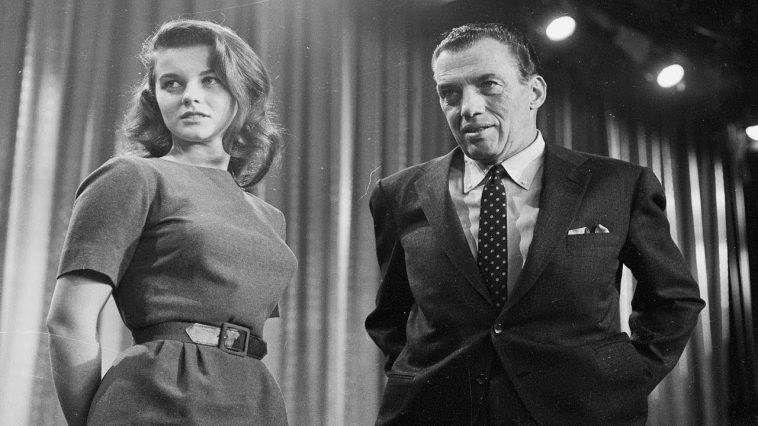According to an article from The Vintage News titled “The Ed Sullivan Show: The Banned Celebrities,” there were a handful of celebrities who were not welcomed on Sullivan’s show. One such individual was Elvis Presley, the King of Rock and Roll, who faced resistance from Sullivan due to his perceived rebellious image and the controversy surrounding his provocative performances. Sullivan eventually invited Presley on his show, leading to one of the most iconic appearances in television history.
Another guest who faced Sullivan’s reluctance was Buddy Holly, an influential rock and roll musician. Sullivan had reservations about Holly’s band’s unconventional appearance, but Holly’s undeniable talent and rising popularity ultimately led to him being featured on the show.
Despite these instances of hesitancy and bans, it’s important to recognize that Ed Sullivan was known for promoting and showcasing a diverse array of talent, particularly during a time when racial and cultural prejudices were prevalent. He provided a platform for many African-American and international acts, breaking down barriers and contributing to the integration of popular culture.
While Ed Sullivan did have reservations and bans on certain guests, his show played a significant role in shaping the landscape of American entertainment by featuring a wide spectrum of performers and breaking down racial and cultural barriers during a crucial period in history.
FactsVerse presents: Ed Sullivan Couldn’t Stand This Singer, He Made it Obvious
Ed Sullivan Couldn’t Stand This Singer, He Made it Obvious
THE ED SULLIVAN SHOW
One of the best late-night shows of all time was The Ed Sullivan Show. It was a show that helped introduce us to many entertainers – especially many singers. Many of our greatest singers who we still listen to today were able to get their big break on The Ed Sullivan Show.
Yet, even though Ed Sullivan allowed these singers on his show there were quite a few whom he couldn’t stand and he made it obvious. He isn’t famous for having the easiest personality and he sometimes is difficult with his guests.
Nevertheless, these guests became well known due to their appearance on The Ed Sullivan Show. Somehow, they had to win the man over – which didn’t always go down well!
FactsVerse Presents: Ed Sullivan Couldn’t Stand This Singer, He Made it Obvious…
ELVIS PRESLEY
Ed Sullivan had a notorious clash with the King of Rock ‘n’ Roll, Elvis Presley. It is during Elvis’s appearances on “The Ed Sullivan Show.”
The tension between the two stemmed from a clash of cultures and values. Ed Sullivan was a conservative figure who aimed to present a wholesome image on his show. He’s appealing to a broad family audience. Elvis Presley, on the other hand, was a groundbreaking artist. His provocative dance moves and raw musical style saw as rebellious and controversial at the time.
ELVIS’ PERFORMANCES
Sullivan was initially hesitant to feature Elvis on his show. It is due to concerns about the suggestive nature of Elvis’s performances and the potential backlash from conservative viewers. However, recognizing Elvis’s immense popularity and the appeal he had for the youth. Sullivan eventually relented and invited Elvis to perform.
Their interactions during the show strains. Sullivan is popular for his reserved demeanor. He found it difficult to catch up with Elvis’s more bubbly personality. Even felt a bit uncomfortable and put off by it. Elvis accustoms to a more relaxed and unrestrained atmosphere during his performances. He may have felt constrained by the show’s strict production guidelines and limited movement on stage.
Despite these differences, the appearances on The Ed Sullivan Show were crucial. It is in propelling Elvis Presley’s career to the national stage. Also, it significantly boosted his popularity and paved the way for his legendary status in the world of music. While their personal dynamics may have been tense, Elvis’s performance on The Ed Sullivan Show helped make him a star.
BUDDY HOLLY
Ed Sullivan had a strained relationship with Buddy Holly. A talented and influential rock and roll artist of the late 1950s whose life and career were both cut short. In fact, one could say that we got a wider knowledge about Buddy Holly. It is due to his appearance on The Ed Sullivan Show.
Their discord primarily revolved around Ed Sullivan not wanting Buddy Holly and The Crickets to perform their song “Oh Boy.” Furthermore, it seemed that the group wasn’t really excited to perform on the show. This angered Ed Sullivan a lot.
Buddy Holly is popular for his innovative sound. Blending rockabilly with country and rhythm and blues, which was fresh and revolutionary for the time.
However, Sullivan was more accustomed to traditional showbiz acts. He often had a particular vision for how he wanted performers to present themselves on his show.
CREATIVE CONTROL AND ARTISTIC FREEDOM
Additionally, Holly, being an emerging artist, sought more creative control and artistic freedom. They clashed with Sullivan’s tendency to exert control over the performances that appeared on his show. Sullivan was known to impose strict rules on artists, dictating song choices, choreography, and attire. It conflicted with Holly’s artistic vision and authenticity.
Their differences culminated in an uncomfortable relationship during Holly’s appearance on The Ed Sullivan Show creating a somewhat tense atmosphere behind the scenes.
Despite the strained relationship, Buddy Holly’s performances on the show were undeniably important for his career, helping to introduce his music to a broader audience and solidify his place in rock and roll history. To this day, his appearance on The Ed Sullivan Show is one of the only recordings we have of him.
THE DOORS
Ed Sullivan’s strained relationship with The Doors and their enigmatic frontman, Jim Morrison, is a well-known chapter in rock and roll history. The clash between the conservative television host and the rebellious rock band was emblematic of the generation gap and cultural shifts of the 1960s.
The Doors were pioneers of the psychedelic rock movement, with Jim Morrison as a charismatic, unpredictable, and often controversial frontman. Ed Sullivan, a symbol of traditional values and family-friendly entertainment, found it difficult to embrace the provocative nature of The Doors’ music and Morrison’s on-stage persona.
When The Doors were booked to perform on The Ed Sullivan Show in 1967, Sullivan requested they alter the lyrics of their song “Light My Fire” to be more socially acceptable. Specifically, he didn’t like them using the word “higher” which he felt implied getting high on drugs. The band agreed during rehearsal, but when they performed live, Jim Morrison defiantly sang the original lyrics, resulting in the band being banned from the show.
MORRISON’S REBELLION AND THE PUBLIC EMBARRASSMENT
Sullivan was infuriated by Morrison’s rebellion and the public embarrassment it caused. This incident marked the end of any possibility of a harmonious relationship between The Doors and Sullivan. The Doors’ countercultural stance and Morrison’s unapologetic defiance were at odds with Sullivan’s desire for control and adherence to mainstream norms.
Ultimately, this clash contributed to The Doors’ image as countercultural icons, and it spotlighted the growing divide between the establishment represented by Sullivan and the emerging youth-driven counterculture of the 1960s. Despite the friction, The Doors’ appearance on Sullivan’s show became a significant moment in rock history, reflecting the changing dynamics of society and entertainment.
BO DIDDLEY
Ed Sullivan’s relationship with Bo Diddley. A pioneering figure in the early days of rock and roll, was marked by tension and disagreement. It is showcasing the clash between artistic expression and traditional expectations.
Bo Diddley, popularfor his innovative rhythms and influential guitar work. It was a boundary-breaking artist, incorporating blues, rhythm and blues, and rock into a unique and electrifying style. He was booked to appear on The Ed Sullivan Show in 1955. Also, he was at the forefront of a musical movement that was challenging the established norms of the time.
Sullivan wanted Bo Diddley to perform a song by Tennessee Ford.
Bo Diddley, however, was determined to stay true to his musical identity and refused to conform to Sullivan’s demands. He insisted on performing his signature hit, “Bo Diddley”. Maintaining his artistic integrity and the integrity of the burgeoning rock and roll movement. This greatly upset Ed Sullivan who said that Bo Diddley was the first “black boy who ever double-crossed him.” This greatly offended Bo Diddley and he never wanted to perform on the show again.
BOB DYLAN
Ed Sullivan’s relationship with the iconic folk and rock singer-songwriter Bob Dylan was complex, marked by a clash of ideologies and a fundamental difference in artistic expression. Dylan, known for his poignant lyrics and thought-provoking music, was a symbol of the counterculture movement and a new wave of folk and rock artists emerging in the 1960s.
In the mid-1960s, at the height of Dylan’s popularity and influence, he was invited to perform on The Ed Sullivan Show a significant platform for exposure at the time. However, Sullivan, once again was representing a more traditional and conservative entertainment industry. He struggled to fully grasp or embrace Dylan’s unconventional style and controversial lyrical themes.
A VOICE FOR SOCIAL AND POLITICAL CONCERN
Dylan was known for using his music to voice social and political concerns, challenging the status quo and advocating for change. On the other hand, Ed Sullivan was known for hosting acts that adhered to a more conventional and mainstream image. This fundamental difference in approach and ideology created tension between the two.
During Dylan’s rehearsals for The Ed Sullivan Show, he ultimately decided to perform his politically charged song, “John Birch Paranoid Blues,” which satirized the political climate of the time and was deemed too controversial for mainstream television.
Oddly enough, this song which poked fun of anyone scared of communism didn’t seem to upset Ed Sullivan. However, the producer wanted Bob Dylan to perform a different song. He refused and cancelled his performance – which forever severed Ed Sullivan’s relationship with him.
SAM COOKE
Ed Sullivan’s relationship with Sam Cooke, a renowned soul and R&B singer and songwriter, got off on the right foot but didn’t end up on the right path.
Sam Cooke was performing his song live on the show and had spent a long time rehearsing and preparing for the show. Unfortunately, filming for the show had gone on overtime so they had to put an end to it. Sam Cooke’s performance was cut short and this naturally greatly upset him.
He never appeared on the show again and the two men never spoke again. Ed Sullivan didn’t feel that it was his fault and felt that Sam Cooke shouldn’t have been upset.
Nevertheless, Ed Sullivan publicly apologized for the incident. The recording of Sam Cooke on The Ed Sullivan Show is one of the few video recordings of the singer.
BEING NOT EASY TO PLEASE
As we can see, Ed Sullivan wasn’t always easy to please and he had his fair share of disputes with several singers. Nevertheless, these appearances are a part of our rich musical archive and if you want to enjoy an evening of great music – just watch reruns of The Ed Sullivan Show.
Are you a fan of any of these singers who were banned or approached with suspicion by Ed Sullivan? Do you remember seeing them perform on the Ed Sullivan show back when it first aired?
In fact, here’s what we’d like to hear from you:
Do you think that today’s late night shows have the power to launch a singer or other performers’ career?
Or do the best talents no longer depend on late night shows to get their big break?



